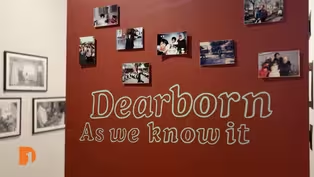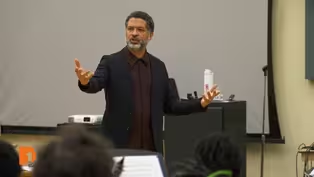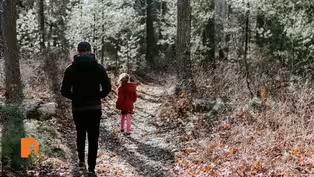
Detroit native Dr. Melba Joyce Boyd named Michigan’s thirdpoet laureate
Clip: Season 9 Episode 43 | 5m 45sVideo has Closed Captions
Dr. Melba Joyce Boyd discusses being named the new Michigan Poet Laureate.
Detroit native Dr. Melba Joyce Boyd has been named Michigan’s new poet laureate by The Michigan Department of Education and Library of Michigan. She is the third person to be selected. “American Black Journal” host Stephen Henderson talked with Boyd about the power of poetry, what her new position as Michigan Poet Laureate entails, and what influences her own writings.
Problems playing video? | Closed Captioning Feedback
Problems playing video? | Closed Captioning Feedback
One Detroit is a local public television program presented by Detroit PBS

Detroit native Dr. Melba Joyce Boyd named Michigan’s thirdpoet laureate
Clip: Season 9 Episode 43 | 5m 45sVideo has Closed Captions
Detroit native Dr. Melba Joyce Boyd has been named Michigan’s new poet laureate by The Michigan Department of Education and Library of Michigan. She is the third person to be selected. “American Black Journal” host Stephen Henderson talked with Boyd about the power of poetry, what her new position as Michigan Poet Laureate entails, and what influences her own writings.
Problems playing video? | Closed Captioning Feedback
How to Watch One Detroit
One Detroit is available to stream on pbs.org and the free PBS App, available on iPhone, Apple TV, Android TV, Android smartphones, Amazon Fire TV, Amazon Fire Tablet, Roku, Samsung Smart TV, and Vizio.
Providing Support for PBS.org
Learn Moreabout PBS online sponsorship(airy music) - [Stephen] Let's start by talking about what a poet laureate is, and what that person does.
- Oh, well, let put it like this.
My job is poetry.
- Yeah, right.
- So.
(Stephen laughs) - [Stephen] And to get people to love poetry.
- Exactly.
- Yeah.
- But the point being to, obviously, do poetry readings, workshops with, you know, with students.
All age levels.
To go into libraries in the state, and do readings for the communities.
And to be available, I think, and excited about the opportunity to promote poetry, especially, in a time where there's less reading, and probably, less reflecting, the very thing that poetry will encourage, and also develop.
- Yeah.
- Hopefully, in our young people.
- Yeah.
I mean, you've been doing this for a long time.
And in addition to teaching at Wayne, and in the African American Studies Department.
I wonder what you make of the place that poetry has in our culture right now.
It does seem more difficult to get people engaged, I think, with poetry, than maybe at other periods.
But I wonder what it looks like from your chair.
- Well, actually, I find that, well, poetry is very important to culture, for sure.
It is the, probably the most artistic of all of the, shall we say, verbal forms of artistic expression.
But like the late Naomi Law Magic said, "It's probably the most underappreciated of all the art forms."
- Yeah.
- But I find, at the same time, that people enjoy it.
They respond to it.
Because it is, generally, pretty intense.
At least, the poetry I write is pretty intense.
(chuckles) - [Stephen] Yeah.
- But I think it's important to encourage, not just, necessarily, that people become poets, but that they view poetry as a resource to stimulate both creative and critical thinking about the world we live in.
And have lived in.
- That intensity that you mentioned, talk about where that comes from, and what you intend for the reader to draw from that intensity.
- Well, there's a passion, hopefully, when people are writing poetry.
I tend to be motivated by people that I know, people that I have encountered both, you know, in real life, and also in literature.
I'm very much influenced by other American poets, particularly African American poets.
They've had a very strong impact on me.
The intensity comes from the form, itself.
That you've got to say a lot more in fewer words - [Stephen] In a very little space, (laughing) right.
- than if you were, you know, doing writing in prose.
And I do write literary history, and essays, and so forth.
But the intensity, I think, is also the delivery.
It's not just the imagery, it's also the sound.
- [Stephen] Yeah.
- Very much like music.
- Quality writing and storytelling in other forms also seems to borrow from poetry, in terms of structure, rhythm, sound.
I think most writers pay attention to those things when they're writing.
And they're getting it, though, from poetry, whether they might, you know, acknowledge that or not.
- Well, certainly, even when you're writing prose, you want it to have a rhythmic structure.
- [Stephen] Yeah, yeah.
- So that you, in effect, capture your audience, and engage them in a manner, sometimes subconsciously.
And using rhyme, slant rhyme, in order to emphasize a point.
Even when I'm writing prose, if the rhythm's not right, I'm like, "Oh no, do, you know, you gotta edit this.
This is not working."
But yes, but I also feel that, as a poet, I'm very much influenced by other art forms.
- Yeah.
- Certainly, music.
As well as visual arts.
I've written poems in response to artists' work.
So it's, for me, important to be actively engaged in the broader artistic community, because it keeps you sharp, it keeps you growing.
And also, when you're writing about art, you can't let it fall flat, right?
So, it's, you know, it's very important, I think, to do that.
Arab American National Museum’s David Serio details the history of Arab immigration in Michigan
Video has Closed Captions
Clip: S9 Ep43 | 7m 2s | One Detroit’s Sarah Zientarski explores the history of Arab immigration in Michigan. (7m 2s)
Video has Closed Captions
Clip: S9 Ep43 | 7m 36s | One Detroit contributor John Penney talks to Detroit Jazz Festival artist-in-residence Jason Moran. (7m 36s)
One Detroit Weekend | Things to do around Detroit this weekend: April 25, 2025
Video has Closed Captions
Clip: S9 Ep43 | 1m 43s | One Detroit contributor Haley Taylor of 90.9 WRCJ shares some events coming up this weekend. (1m 43s)
Providing Support for PBS.org
Learn Moreabout PBS online sponsorshipSupport for PBS provided by:
One Detroit is a local public television program presented by Detroit PBS














